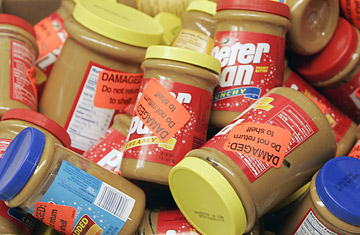
Returned jars of Peter Pan Peanut Butter. Peanut Butter was the casue of an outbreak of salmonella early this year.
In the wake of a series of scares involving E.coli-laden spinach, poisoned pet food and salmonella-tainted peanut butter and snack puffs, it seemed safe to assume that the nation's food supply wasn't particularly well-safeguarded. On Tuesday, Congress made it clear just how vulnerable it is, in a House investigative hearing that identified the Food and Drug Administration (FDA) as underfunded, understaffed, and unprepared to ensure the safety of foreign food imports into the United States.
Republican and Democratic lawmakers alike piled the bad news on FDA Commissioner Dr. Andrew von Eschenbach—asserting that a plan to close 7 of the FDA's 13 labs would further weaken an already impotent agency that has very little power to preemptively halt contaminated food from entering the country.
"Preliminary findings confirm...that the FDA has failed to adequately respond to increased imports of foreign food products," said Energy and Commerce Committee Senior Investigator David Nelson in his testimony before a House subcommittee. "Recent accounts of tainted imports from China provide additional evidence, simply stated, that FDA lacks sufficient resources and authority to ensure food safety and that legislation will be needed to correct these deficiencies."
The shortcomings listed were legion. Despite a marked uptick in imported food, the amount actually inspected by the FDA has fallen precipitously, said Rep. Bart Stupak, a Michigan Democrat and chair of the oversight and investigations subcommittee. "While FDA inspects less than one percent of all imported foods, only a small fraction of that is actually tested for contaminants," said Stupak. Furthermore, food that is suspected of contamination is typically tested by private labs that the FDA has no jurisdiction over and which importers have learned to manipulate. There are also not enough staff members to give shipments more than a cursory look. In the San Francisco office, for example, four reviewers are overwhelmed to the point that they can typically devote only 30 seconds or less to each individual shipment. With the FDA allowing imports to come in at over 300 ports of entry, it would be impossible to have staff at each facility, said the panel, leaving great potential for shady importers to take advantage. "They know what ports to go into, they know where the FDA does not have an inspector or a lab, and they know what private labs they can go to for testing," said Kevin Barstow, investigative counsel for the committee.
Some attempted to draw a link between the FDA's deficiencies and the potential for domestic terrorism. "Who needs al-Qaeda when you have E.coli," quipped Democratic Rep. Jay Inslee, of Washington. Others were more specific. "The wheat gluten incident (in which imported pet food was discovered with poisoned wheat flour) drew a road map for anyone who wanted to attack us maliciously," said Nelson. He feared that the large holes in inspection coverage that would leave the country open to sabotage, saying, "They just have to find the [products] that are not being reviewed at all." William Hubbard, former associate FDA commissioner, called the agency's woes, "a perfect storm—a scenario in which the United States is flooded with an enormous volume of food from abroad, where the risks to food are greater than ever before at a time in which the FDA's ability to protect our food supply is growing ever weaker."
After several hours of hearing lobs thrown at his agency, Commissioner von Eschanbach got the chance to respond, though he was short on specifics and long on general pronouncements about the need for the FDA to start using "21st century science." It was a phrase that he used often as an explanation for the lab closures, referring to them as necessary consolidations and saying that they were "intended to bring FDA's laboratory infrastructure into the 21st century." To demonstrate the future, von Eschanbach pulled out a large, gun-like device that could be used to immediately identify whether bottled water contained arsenic or other heavy metals.
Von Eschanbach followed up his committee appearance with a visit to the White House Wednesday where President Bush announced the creation of an import safety panel, headed up by Secretary of Health and Human Services Michael Leavitt.The group will report back in 60 days with an updated food safety plan focused on both the countries and companies that import food into the U.S.
Rep. John Dingell, a Michigan Democrat, said he planned to introduce legislation within the next week that would provide more authority to the FDA. It would likely include a user-fee similar to the one Democratic Sen. Dick Durbin of Illinois—who has long lobbied for food safety reform—introduced in a bill last week. In that legislation, companies wanting to import food into the United States would have to pay a fee, the revenue of which would pay for greater inspection capabilities and research into food safety technology. If passed, it would increase the number of food shipments inspected from about one percent to a whopping...three to four percent of total imports.
